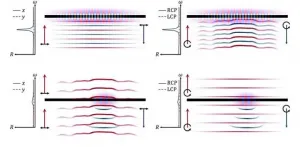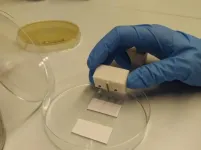Large-scale study finds AI-powered COVID-19 solution by RADlogics reduces turnaround time
The Moscow Center for Diagnostics and Telemedicine presented clinical research findings during ECR 2021 highlighting that full integration of AI into radiology workflow during the pandemic increased radiologists' productivity
2021-03-19
(Press-News.org) MOSCOW, RUSSIA -
Moscow Center for Diagnostics & Telemedicine and RADLogics shared the results of a large-scale study (Moscow Experiment on the Computer Vision for the Analysis of Medical Images - mosmed.ai, NCT04489992) conducted by the Research and Practical Clinical Center for Diagnostics and Telemedicine Technologies of the Moscow Health Care Department. The clinical research found that the introduction of RADLogics' AI-Powered solution into radiology workflow to analyze Chest-CT scans during the COVID-19 pandemic reduced report turnaround time by an average of 30 percent, which is equivalent to 7 minutes per case.
Presented by Dr. Tatiana Logunova, MD, of the Research and Practical Clinical Center for Diagnostics and Telemedicine Technologies of the Moscow Health Care Department during the recent ECR 2021 conference, the extensive research included a total of 128,350 Chest-CT scans, of which 36,358 were processed by RADLogics AI-Powered COVID-19 solution, reported by 570 participating radiologists at over 130 hospitals and outpatient clinics in Moscow.
"Early on in the pandemic, it was clear to us that COVID-19 required new healthcare management approaches, and effective clinical management depends more on disease severity than on the virus identification," said Dr. Sergey Morozov, MD, PhD, MPH, who serves as CEO of Moscow Diagnostics and Telemedicine Center. "As a result, the aim of our research was to determine the impact of the introduction of AI-services analyzing Chest-CTs for COVID-19 related findings on the radiologists' workflow and performance. In addition to finding that the integration of AI did not have a negative effect on the interpretation or report accuracy, our researchers found a significant improvement in productivity and report turnaround time by the expert radiologists that leveraged AI."
The study was conducted over two separate phases with the first taking place between April 30, 2020 to June 18, 2020 and the second taking place between June 18, 2020 to August 31, 2020. The study found that report turnaround time was significantly shorter for all time periods in a group of radiologists with available AI results that were seamlessly integrated into radiologists' current workflow, compared to a group with non-available AI results. In addition, in the shift between the two study time periods, additional clinical parameters were added to the standard of care, including the addition of a disease severity score. The added information created an increased workload on radiologists, which increased the average read time by more than 25 percent. In response, the RADLogics AI-Powered COVID-19 solution was enhanced to support the new clinical requirements. Results shown indicate that with the augmented AI solution, including all clinical measurements and severity scoring, was able to maintain the overall productivity gain of 30 percent.
"We applaud this significant real-world research by Dr. Morozov and his team, who were on the frontline of Moscow's successful fight against the COVID-19 pandemic while demonstrating the value of embracing new AI technologies to aid in these efforts," said Moshe Becker, CEO and Co-Founder of RADLogics. "This study - first of its kind in its scale - demonstrates the full potential of AI as a tool to augment radiologists to increase throughput, improve efficiency and reduce time-to-treatment. This research provides large-scale clinical validation to an earlier academic study by UCLA that was published in Academic Radiology, which conducted a time-motion study using our AI-powered solution to measure the impact of our solution on radiologists' productivity that found out using our solution saved up to 44 percent in radiologists' reading time."
Since the start of the pandemic, RADLogics has responded with the deployment of the company's AI-Powered medical image analysis solution worldwide. Designed for easy installation and integration both on-site and via the cloud, RADLogics' algorithms are supported by the company's patented software platform that enables rapid deployment at multiple hospitals, and seamless integration with existing workflows. In accordance with FDA guidance for imaging systems and software to address the COVID-19 public health emergency, RADLogics has made its FDA cleared CT and X-ray solutions available to hospitals and healthcare systems throughout the U.S. for patient triage and management. All the company's AI-Powered solutions are available worldwide through major OEM distribution partners including Nuance via the AI Marketplace in the U.S. market.
"In addition to the sheer scale of this research, it is important to note the demonstrated ability of our AI-powered solution to quickly adapt to the change in clinical requirements and maintain the overall performance as demonstrated in the second phase of the study," added Becker. "In the near-term, responsive and scalable AI algorithms could play a critical role as healthcare systems across the world contend with potential coronavirus surges as new variants spread - not to mention the tremendous burnout and economic pressures across the healthcare sector. In the long-term, this groundbreaking research also illustrates the tremendous benefit of adopting robust AI platforms that can be deployed rapidly at scale and seamlessly integrated into existing workflows to augment radiology teams."
Dr. Morozov's research team from the Moscow Center for Diagnostics & Telemedicine Center included Drs. T. Logunova, A. E. Andreychenko, V. Klyashtorny, K. M. Arzamasov, and A. Vladzymyrskyy. The presentation entitled "Artificial intelligence services impact on radiologist's performance in the context of the COVID-19 pandemic" is available for ECR 2021 registrants at https://connect.myesr.org/course/artificial-intelligence-ai-and-covid-19/.
INFORMATION:
About RADLogics
RADLogics is a healthcare software company developing AI-powered solutions that support image analysis to improve radiologists' productivity while enhancing patient outcomes. Based in New York, NY, U.S., and Tel Aviv, Israel, RADLogics is one of the pioneers in using AI & machine learning image analysis and advanced big data analytics to analyze imaging data from CTs, MRIs, PET scans, and X-rays to help reduce diagnostics turnaround time from hours to minutes by automating detection and report generation functions. The company's patented AI medical image analysis platform enables rapid development of AI algorithms, and provides seamless integration into existing radiology workflow. Visit http://www.radlogics.com to learn more or follow us on LinkedIn or Twitter. To contact RADLogics to request a demonstration or to sign up for our monthly newsletter, please visit http://www.radlogics.com/contact.
About Moscow Center for Diagnostics & Telemedicine Center
The center was founded on August 1, 1996, in Moscow. The center provides scientific, technological, educational, organizational, and methodological support to medical organizations, manufacturers of medical equipment, and doctors. The center is a leading scientific and practical organization that ensures the development and efficiency improvement of diagnostic radiology services. Our mission is to improve people's health by improving the quality and safety of diagnostics, and train leaders of future medicine. Please visit tele-med.ai and mosmed.ai to learn more including the center's major projects such as the following:
- Integration of URIS and UMIAS
- Artificial intelligence, computer vision
- Moscow Reference Center of medical imaging diagnostics
- Implementation of speech recognition technology in radiology departments
- Development of AI standards in healthcare
ELSE PRESS RELEASES FROM THIS DATE:
2021-03-19
TROY, N.Y. -- A novel form of polymerized estrogen developed at Rensselaer Polytechnic Institute can provide neuroprotection when implanted at the site of a spinal cord injury -- preventing further damage. This promising result, found in a preclinical model, was recently published in ACS Chemical Neuroscience, and it lays the groundwork for further advancement of this new biomaterial.
"What we saw that gives us hope is more neuroprotection, meaning we saw more spared neurons and more spared axons in the tissue," said Ryan Gilbert, a professor of biomedical engineering at Rensselaer, and co-author on this paper. "We believe that the estrogen released from our biomaterial design is providing a neuroprotective response."
After a spinal cord injury, the body's inflammatory ...
2021-03-19
The results showed that several psychological well-being measures gradually increased within participants from the beginning to the end of the course. That was especially true for life satisfaction, perceived well-being, self-awareness and emotional self-regulation. The participants in the study also reported a significant decrease in anxiety, perceived stress, negative thoughts, rumination and anger tendencies. The researchers observed, simultaneously, improvements in the positive aspects and a reduction of negative emotions, both in the short term and longitudinally ...
2021-03-19
UNIVERSITY PARK, Pa. -- Stress is a universal human experience that almost everyone deals with from time to time. But a new study found that not only do some people report feeling no stress at all, but that there may be downsides to not experiencing stress.
The researchers found that people who reported experiencing no stressors were more likely to experience better daily well-being and fewer chronic health conditions. However, they were also more likely to have lower cognitive function, as well.
David M. Almeida, professor of human development and family studies at Penn State, said the study suggests that small, daily stressors could potentially benefit the brain, despite being an inconvenience.
"It's possible that experiencing stressors creates opportunities for you ...
2021-03-19
Three University of Colorado Cancer Center researchers are part of a team that recently published a paper offering new insight into how the immune system relates to cancer. Quentin Vicens, PhD, Jeffrey Kieft, PhD, and Beat Vögeli, PhD, are authors on the paper, which looks at how an enzyme called ADAR1 operates in pathways associated with cancer.
"In a cell, ADAR1 edits native RNA -- or self-RNA -- so that the cell recognizes it as its own. It's a key protection against autoimmune disorders," Kieft says. "But if a virus infects, viral RNA isn't edited by ADAR1, so the cell can recognize that and react. The cell knows it has foreign RNA, and it activates immune responses to fight off that infection."
For their paper published last month in the ...
2021-03-19
Nearly two-thirds of middle-aged and older adults in Canada report adverse childhood experiences
Hamilton, ON (Mar. 19, 20121) - New research from McMaster University has found that roughly three in every five Canadian adults aged 45 to 85 have been exposed to childhood abuse, neglect, intimate partner violence or other household adversity.
The research, which estimates the prevalence of a broad range of adverse childhood experiences, was published in CMAJ Open.
"Our research showed that adverse childhood experiences are highly prevalent in the Canadian population, with 62% of Canadian adults aged 45 to 85 reporting at least one exposure," said Divya Joshi, the study's lead author and a postdoctoral fellow in the Department ...
2021-03-19
In 1961, physicist Ugo Fano provided the first theoretical explanation to an anomalous asymmetry observed in the spectral profiles of noble gases. He put forth an impactful interpretation of this phenomenon, now called "Fano resonance," stating that if a discrete excited state of a system falls within the energy range of a continuum of other possible states, these two can interfere with each other and give rise to abnormal peaks and dips in the system's frequency response.
Though Fano resonance can occur in various physical systems, recent progress in metasurfaces and nanotechnology has drawn attention to this phenomenon as a potentially powerful tool in optics. ...
2021-03-19
The Research Group on Synthetic Biology for Biomedical Applications at Pompeu Fabra University in Barcelona, Spain, has designed a cellular device capable of computing by printing cells on paper. For the first time, they have developed a living device that could be used outside the laboratory without a specialist, and it could be produced on an industrial scale at low cost. The study is published in Nature Communications and was carried out by Sira Mogas-Díez, Eva Gonzalez-Flo and Javier Macía.
We currently have many electronic devices available to us such as computers and tablets whose computing power is highly efficient. But, despite their ...
2021-03-19
DALLAS, March 19, 2021 -- Mechanical removal of blood clots causing a stroke is increasing, yet racial differences in treatment persist, according to late-breaking science presented today at the American Stroke Association's International Stroke Conference 2021. The virtual meeting is March 17-19, 2021 and is a world premier meeting for researchers and clinicians dedicated to the science of stroke and brain health.
Mechanical clot-removal or endovascular therapy is a non-surgical treatment that uses tiny tubes, or catheters, to remove a blood clot. In 2015, several major clinical trials confirmed that endovascular therapy ...
2021-03-19
In Brazil, researchers affiliated with the Center for Nuclear Energy in Agriculture (CENA) and the Luiz de Queiroz College of Agriculture (ESALQ), both part of the University of São Paulo (USP), have developed a methodology based on artificial intelligence to automate and streamline seed quality analysis, a process required by law and currently done manually by analysts accredited with the Ministry of Agriculture.
The group used light-based technology like that deployed in plant and cosmetics analysis to acquire images of the seeds. They then turned to machine learning to automate the image interpretation ...
2021-03-19
DALLAS, March 19, 2021 -- New research found patients hospitalized with COVID-19 had a higher risk of stroke, compared with patients who had similar infectious conditions such as influenza and sepsis in prior studies. Those who had an ischemic stroke were more likely to be older, male, Black race, or have high blood pressure, Type 2 diabetes or an irregular heartbeat (atrial fibrillation) compared with other COVID-19 patients, according to late-breaking science presented today at the American Stroke Association's International Stroke Conference 2021. The meeting is being held virtually, March 17-19, 2021 and is a world premier meeting for researchers and clinicians dedicated ...
LAST 30 PRESS RELEASES:
[Press-News.org] Large-scale study finds AI-powered COVID-19 solution by RADlogics reduces turnaround time
The Moscow Center for Diagnostics and Telemedicine presented clinical research findings during ECR 2021 highlighting that full integration of AI into radiology workflow during the pandemic increased radiologists' productivity


